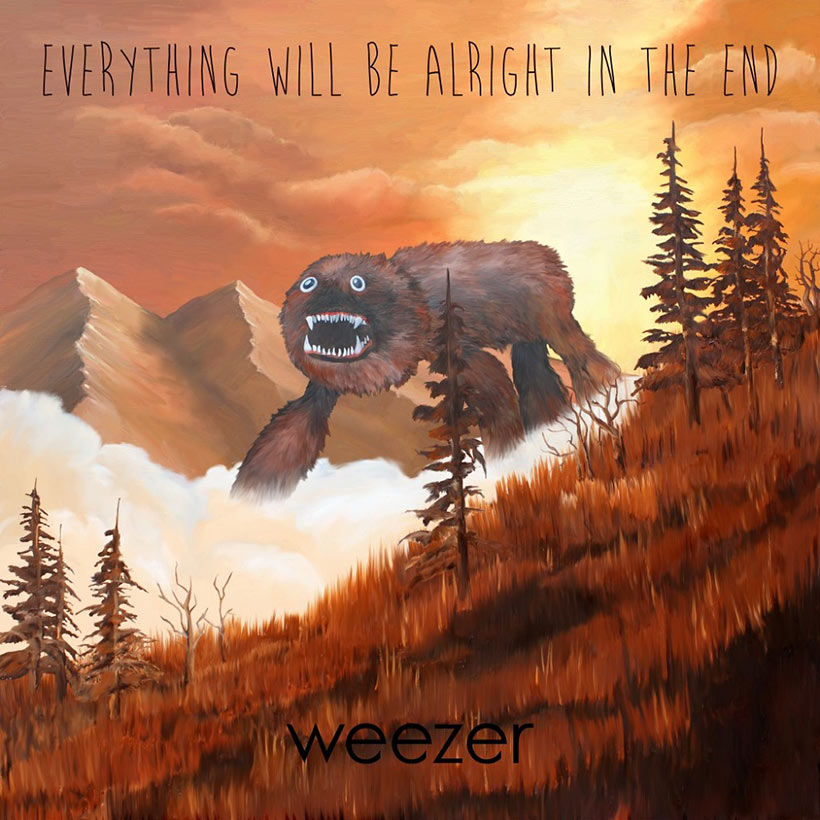
One of the most self-aware albums ever written, Weezer’s ninth studio effort, Everything Will Be Alright In The End, returned the alt-rock legends to their roots with a deeply honest collection of songs that delved into frontman Rivers Cuomo’s relationships with women, his father and, perhaps most notably, his fans. The years leading up to Everything Will Be Alright In The End had, however, found the band straying from the nerdy alt-rock that made them famous in the 90s, leaving listeners scratching their heads after releases like 2008’s Weezer (aka “Red Album”), Raditude (2009), and Hurley (2010).
Listen to Everything Will Be Alright In The End now.
On a sonic mission
Following the release of Hurley, Weezer began working on new material with the intention of putting out an album the following year. Hitting creative blocks, they shelved the recordings and took a hiatus. Fittingly, while on a meditation retreat, Cuomo had a breakthrough, envisioning what would become the profoundly introspective Everything Will Be Alright In The End. The band returned to the studio, reuniting with The Cars’ Ric Ocasek, who produced Weezer’s multi-platinum self-titled debut (aka “Blue Album”) and their critically-acclaimed 2001 record, “Green Album.” Together, they were on a sonic mission to dig into their past.
The Everything Will Be Alright In The End announcement promised “that sound from the band’s earliest days to tell new stories in 2014.” The group heard their fans – who yearned for the Weezer of yesteryear – loud and clear, and replied with the album’s first single, “Back To The Shack,” which dropped months before the album’s release.
Backed by punchy guitar riffs and an anthemic chorus, Cuomo asks his fans for forgiveness in the song. He sings, “Sorry, guys, I didn’t realize that I needed you so much/I thought I’d get a new audience, I forgot that disco sucks/I ended up with nobody and I started feeling dumb/Maybe I should play the lead guitar and Pat should play the drums.”
“Back To The Shack” also served as an introduction to Everything Will Be Alright In The End’s unique thematic structure, as Cuomo reveals in the song: “I finally settled down with my girl and I made up with my dad/I had to go and make a few mistakes so I could find out who I am/I’m letting all of these feelings out even if it means I fail/’Cause this is what I was meant to do and you can’t put that on sale..”
Intricately structured
Each track on Everything Will Be Alright In The End falls into one of three distinct themes. The first, which the band christened Belladonna, centers around Cuomo’s relationships with women and consists of the tracks “Ain’t Got Nobody,” “Lonely Girl,” “Return To Ithaka” and “Go Away” (featuring vocals from Best Coast’s Bethany Cosentino), along with the singles “Cleopatra” and “Da Vinci.”
The second theme, The Panopticon Artist, revolves around the band’s relationship with their fans. Fittingly, the name references 18th-century philosopher Jeremy Bentham’s ideation of a prison with constant surveillance, not far off from the notion of celebrity in the 21st Century. The songs in this group include “I’ve Had It Up To Here (co-written by The Darkness’ Justin Hawkins), “The Waste Land” and, of course, “Back To The Shack.”
Finally, Patriarchia focuses on relationships with father figures, and includes the songs “Eulogy For A Rock Band,” “The British Are Coming,” “Foolish Father” and “Anonymous.” This isn’t the first instance of Cuomo singing about paternal issues. “Say It Ain’t So,” from the “Blue Album”, probed the songwriter’s troubled relationship with his absent father. This time around, however, Cuomo has children of his own, and songs like “Foolish Father” sound like he’s addressing them, apologizing for his behavior.
An album this intricately structured wouldn’t be complete without a grand finale. Three songs – one from each theme – conclude the record in what the band referred to as The Futurescope Trilogy. The trilogy includes “Anonymous,” as well as two instrumental tracks, “The Waste Land” and the epic “Return To Ithaka.”
A successful therapy session
Weezer’s humble look in the mirror paid off. Upon its release, on October 7, 2014, Everything Will Be Alright In The End was warmly received by fans and critics alike. In fact, it was the band’s best-reviewed album since their 1996 cult classic, Pinkerton. Everything Will Be Alright In The End peaked at No.5 on the Billboard 200 and, coincidentally, was Weezer’s fifth album to hit the Top 5.
Though Weezer had delved into personal matters on earlier albums – Pinkerton famously chronicled the darker sides of fame, encounters with groupies, struggles with identity and dysfunctional relationships – Everything Will Be Alright In The End finds the band older, wiser, and more mature. Acknowledging his faults, Cuomo is coming to terms with his past and finding resolution, and so are Weezer’s fans.
In perhaps the most self-aware moment on the album, the song “Father Figure” closes out with a chorus of some of the band’s biggest fans singing “Everything will be alright in the end.” It feels like a successful therapy session – a deep breath exhaled. And, by the end of the album, everything really does feel like it’s going to be alright for all parties involved.
Weezer’s Everything Will Be Alright In the End can be bought here.
source https://www.udiscovermusic.com/stories/weezer-everything-will-be-alright-in-the-end/

